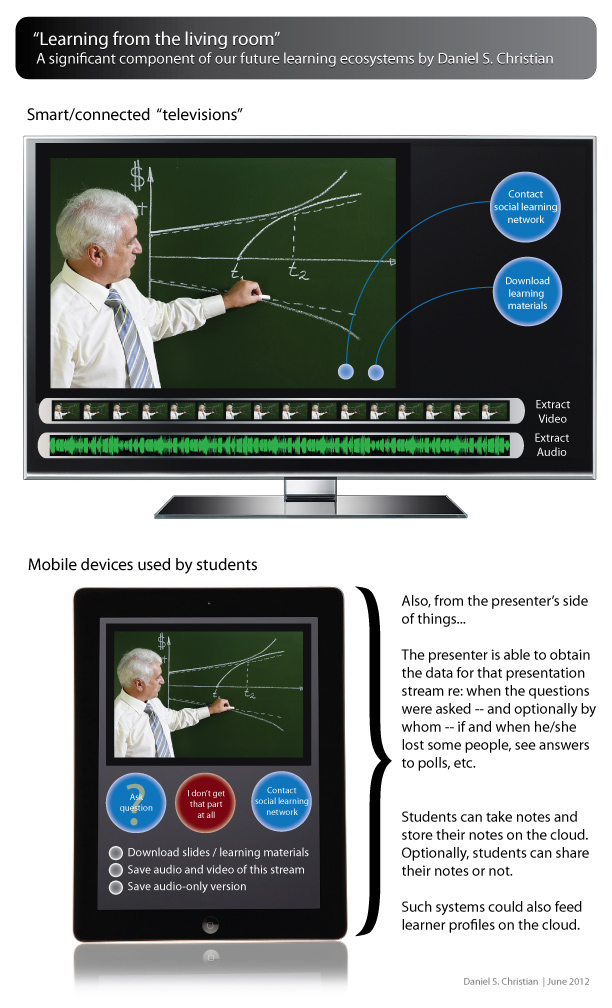From DSC:
I continue to watch this space as the foundations are being put into place for what I’m calling, “Learning from the Living [Class] Room.”
.

.
Excerpt:
As part of the ongoing Babson Survey Research Group’s online learning reports, we have asked institutional academic leaders questions on their knowledge, use and opinion of OER as part of the 2009 – 2011 surveys. In addition, we have conducted surveys asking faculty in higher education and academic technology administrators their opinions of these resources. Finally, our survey of faculty on their use of social media also asked for faculty opinions on OER. This report contains the results from all these data collection efforts.
Book description:
Wired magazine editor and bestselling author Chris Anderson takes you to the front lines of a new industrial revolution as today’s entrepreneurs, using open source design and 3-D printing, bring manufacturing to the desktop. In an age of custom-fabricated, do-it-yourself product design and creation, the collective potential of a million garage tinkerers and enthusiasts is about to be unleashed, driving a resurgence of American manufacturing. A generation of “Makers” using the Web’s innovation model will help drive the next big wave in the global economy, as the new technologies of digital design and rapid prototyping gives everyone the power to invent — creating “the long tail of things”.
Also see:
.
.
Addendums/also see:
Open Goldberg Variations: free, open source recording and modern score of classical masterpiece — from boingboing.net/ by Rob Beschizza
.
.
Excerpt:
Performed by Kimiko Ishizaka on a Bösendorfer 290 Imperial in Berlin’s Teldex Studio, there’s already plenty to love about a new cut of Bach’s Goldberg Variations. But this one is also the first fan-funded, open source, and completely free recording of it.
“Every part of it is free for you to use, share, and copy,” said Robert Douglass, who launched the successful Kickstarter project behind Werner Schweer’s new version of the classic score and its production.
Elite universities’ online play — from insidehighered.com by Steve Kolowich
Excerpt:
Princeton University, the University of Pennsylvania and the University of Michigan at Ann Arbor have teamed up with a for-profit company to offer free versions of their coveted courses this year to online audiences. By doing so, they join a growing group of top-tier universities that are embracing massively open online courses, or MOOCs, as the logical extension of elite higher education in an increasingly online, global landscape.
Princeton, Penn and Michigan will join Stanford University and the University of California at Berkeley as partners of Coursera, a company founded earlier this year by the Stanford engineering professors Daphne Koller and Andrew Ng. Using Coursera’s platform, the universities will produce free, online versions of their courses that anyone can take.
Also see:
Blackboard launches Open Source Services Group — from Blackboard
Company will support both commercial & open source systems
WASHINGTON – March 26, 2012 – Blackboard Inc. today announced the launch of Blackboard Education Open Source Services, a new effort to support clients using open source education technologies. With the announcement, the company will continue to focus on its flagship Blackboard Learn™ platform as well as ANGEL and Edline, while also helping institutions successfully manage open source learning management systems (LMS) including Moodle and Sakai.
The move complements Blackboard’s existing focus on supporting the entire education experience with products and services for learning management as well as mobility, real time collaboration, analytics, campus services and notification, and other needs. Blackboard already serves hundreds of institutions that use Moodle, Sakai and other LMS systems in tandem with these additional education-focused solutions. In extending its focus to include open source options, Blackboard can support a wider variety of approaches to online learning and help institutions increase the value they get from technology of all kinds.